Unlock Amazing ROI from ServiceNow with Powerful KPI Dashboards
Enhance ServiceNow decision-making with real-time dashboards that identify savings opportunities, monitor performance, and predict future results.
Enhanced Efficiency & Cost Control:
Automate and track procurement and supplier activities to reduce manual efforts and minimize delays.
Improved Visibility & Compliance:
Gain real-time insights into IT expenditures, ensure adherence to purchasing policies, and foster transparency.
Predictive Insights & Strategic Decision-Making:
Use advanced analytics to identify trends, mitigate risks, and align procurement strategies with business goals.
The ODS ROI Dashboard ExtendsSource-to-Pay with Real-Time Analyticsthat Unlocks Millions in Savings
Order Process Automation
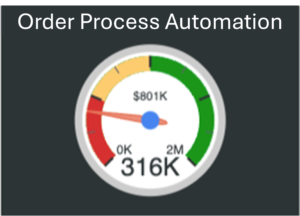 Order Process Automation simplifies the procurement process by implementing automated workflows to manage routine order processing tasks. This minimizes the need for manual intervention, speeds up cycle times, and enhances accuracy. With features such as the Touchless Order™ process, specific product requests can be fully automated, completely eliminating overhead and allowing procurement staff to concentrate on strategic, value-added activities.
Order Process Automation simplifies the procurement process by implementing automated workflows to manage routine order processing tasks. This minimizes the need for manual intervention, speeds up cycle times, and enhances accuracy. With features such as the Touchless Order™ process, specific product requests can be fully automated, completely eliminating overhead and allowing procurement staff to concentrate on strategic, value-added activities.
Procurement Governance
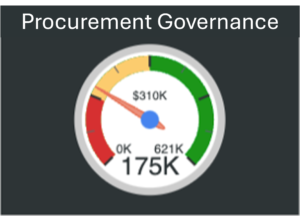 Procurement governance defines the policies and processes that guide purchasing activities to ensure compliance, manage risks, and optimize spending. It incorporates spend management practices to monitor and regulate procurement, ensuring adherence to preferred suppliers, contracts, and budget goals. This framework enhances accountability, reduces unauthorized purchases, and maximizes value from supplier relationships.
Procurement governance defines the policies and processes that guide purchasing activities to ensure compliance, manage risks, and optimize spending. It incorporates spend management practices to monitor and regulate procurement, ensuring adherence to preferred suppliers, contracts, and budget goals. This framework enhances accountability, reduces unauthorized purchases, and maximizes value from supplier relationships.
Strategic Sourcing
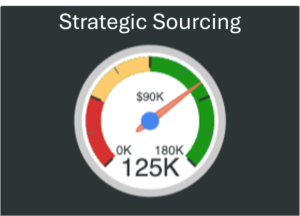 Strategic sourcing is a systematic approach to optimize supplier selection and procurement strategies. It focuses on analyzing spending, evaluating suppliers, and assessing market conditions to achieve the best value. Key activities include spend analysis, supplier selection, contract negotiation, and aligning with corporate goals for cost savings and risk reduction.
Strategic sourcing is a systematic approach to optimize supplier selection and procurement strategies. It focuses on analyzing spending, evaluating suppliers, and assessing market conditions to achieve the best value. Key activities include spend analysis, supplier selection, contract negotiation, and aligning with corporate goals for cost savings and risk reduction.
Contract Terms Management
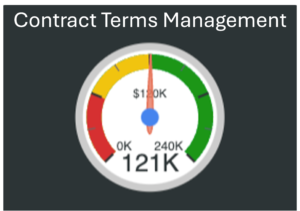 Contract Terms Management improves supplier agreements by securing benefits like volume rebates, early payment discounts, and free shipping. It controls price increases through clear terms and proactive renegotiations. Centralized contract management ensures timely renewals and compliance, aligning contracts with business goals and strengthening supplier relationships.
Contract Terms Management improves supplier agreements by securing benefits like volume rebates, early payment discounts, and free shipping. It controls price increases through clear terms and proactive renegotiations. Centralized contract management ensures timely renewals and compliance, aligning contracts with business goals and strengthening supplier relationships.
Carrying Cost Efficiency
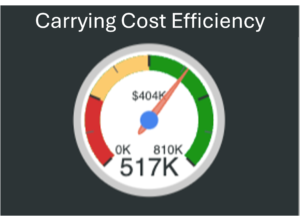 Carrying cost efficiencies focus on reducing the expenses related to holding and managing inventory, including costs for storage, depreciation, and obsolescence. Strategies to achieve this include minimizing inventory holding times, optimizing stock levels through demand forecasting, and implementing FIFO (First-In-First-Out) practices. By streamlining inventory management, organizations can lower overhead costs, improve cash flow, and enhance overall operational efficiency.
Carrying cost efficiencies focus on reducing the expenses related to holding and managing inventory, including costs for storage, depreciation, and obsolescence. Strategies to achieve this include minimizing inventory holding times, optimizing stock levels through demand forecasting, and implementing FIFO (First-In-First-Out) practices. By streamlining inventory management, organizations can lower overhead costs, improve cash flow, and enhance overall operational efficiency.
Asset Lifecycle Management
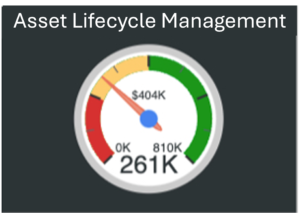 Asset Lifecycle Management manages an asset from request to retirement. It aims to maximize performance, extend lifespan, and reduce costs through planning, procurement, operation, maintenance, and decommissioning. By leveraging real-time data and predictive analytics, organizations can make better decisions, optimize maintenance, and enhance efficiency while minimizing downtime and promoting sustainability.
Asset Lifecycle Management manages an asset from request to retirement. It aims to maximize performance, extend lifespan, and reduce costs through planning, procurement, operation, maintenance, and decommissioning. By leveraging real-time data and predictive analytics, organizations can make better decisions, optimize maintenance, and enhance efficiency while minimizing downtime and promoting sustainability.
Supply Base Optimization
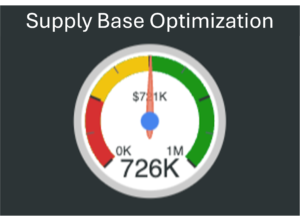 Supply Base Optimization improves supplier management by eliminating inactive or low-use vendors, consolidating spend with key suppliers, and leveraging buying power to secure better terms. This enhances efficiency, boosts supplier performance, and fosters stronger partnerships while minimizing risks and uncovering cost-saving opportunities throughout the supply chain.
Supply Base Optimization improves supplier management by eliminating inactive or low-use vendors, consolidating spend with key suppliers, and leveraging buying power to secure better terms. This enhances efficiency, boosts supplier performance, and fosters stronger partnerships while minimizing risks and uncovering cost-saving opportunities throughout the supply chain.
Invoice Process Optimization
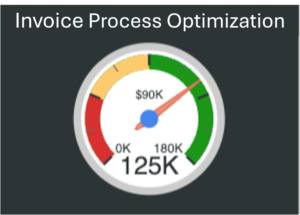 Optimizing the invoice process enhances efficiency by automating workflow from receiving to approving invoices. Centralized systems ensure consistent processing and seamless integration with Accounts Payable, reducing manual intervention and errors, speeding up payment cycles, and improving supplier relationships.
Optimizing the invoice process enhances efficiency by automating workflow from receiving to approving invoices. Centralized systems ensure consistent processing and seamless integration with Accounts Payable, reducing manual intervention and errors, speeding up payment cycles, and improving supplier relationships.
Case Study:
How a Manufacturer Saves$1.4 Million Annually withServiceNow's Source-to-Pay
The Challenge
In today’s modern, digitized economy, businesses must distribute, analyze, and interpret transactional data effectively to enable leadership to make real-time, pinpoint adjustments in strategy and operational cadence. Deferred, misunderstood, or improperly shared data can lead to financial losses and customer dissatisfaction. A customer sought a solution to unify geographically dispersed stores, offices, and executive-level divisions under a framework that would allow leadership to interpret and understand opportunities for process improvement, cost savings, and tighter operational control.
Key stakeholders often lacked awareness of how data from other departments could unlock actionable business intelligence, influencing tactical and strategic decision-making within their own areas. Historically, departments focused solely on their financial performance, ignoring how activities in other divisions impacted their bottom line. The customer needed a way to capture, extract, synthesize, and distribute data that was verifiable, precise, and refreshed in real-time, eliminating a silo culture that emphasized narrow accountability over enterprise-wide collaboration.
The Solution
Recognizing the need to connect information with intelligence for quicker, smarter, and more profitable decisions, the customer turned to ServiceNow Source-to-Pay. We leveraged ServiceNow’s capabilities to define, develop, test, implement, and maintain an optimized, scalable solution for the customer’s enterprise. This solution created a universe of accessible, actionable data that increased ROI while accommodating exponential growth.
With a focus on understanding the customer’s needs, challenges, and goals, we leveraged our extensive Procurement and Supply-Chain expertise to provide a right-sized solution fitting the customer’s scale. By combining ServiceNow Source-to-Pay with the platform’s extensible capabilities, we delivered a tailored framework offering unparalleled access and control to designated users. For the first time, customer leaders could record, interpret, and distribute critical transactional data in real-time across the enterprise, maintaining platform best practices and simplifying the process of applying enhancements and upgrades.
Recognizing the need to connect information with intelligence for quicker, smarter, and more profitable decisions, the customer turned to ServiceNow Source-to-Pay. We leveraged ServiceNow’s capabilities to define, develop, test, implement, and maintain an optimized, scalable solution for the customer’s enterprise. This solution created a universe of accessible, actionable data that increased ROI while accommodating exponential growth.
With a focus on understanding the customer’s needs, challenges, and goals, we leveraged our extensive Procurement and Supply-Chain expertise to provide a right-sized solution fitting the customer’s scale. By combining ServiceNow Source-to-Pay with the platform’s extensible capabilities, we delivered a tailored framework offering unparalleled access and control to designated users. For the first time, customer leaders could record, interpret, and distribute critical transactional data in real-time across the enterprise, maintaining platform best practices and simplifying the process of applying enhancements and upgrades.
The Outcome
Implementing ServiceNow Source-to-Pay transformed the customer’s procurement processes into a fully integrated enterprise solution. Key benefits included:
- Enhanced Efficiency and Cost Control: The streamlined procurement processes reduced manual errors, expedited cycles, and optimized resources, leading to significant cost savings.
- Improved Visibility and Compliance: Integrated workflows provided real-time insights into IT expenditures, ensuring regulatory compliance and fostering transparency and accountability.
- Strategic Decision-Making and Innovation: Better alignment with business objectives and enhanced collaboration between IT, finance, and procurement teams drove informed decisions, fostering innovation and a competitive edge.
By breaking down silos and promoting a culture of collaboration, the customer achieved better process control, cost savings, and a more agile, responsive operational framework, ultimately driving financial health and competitive advantage.
